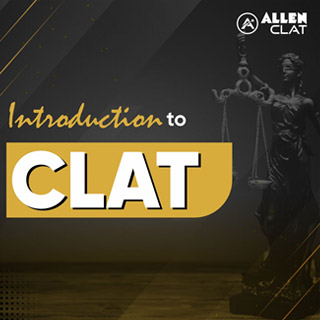Our Blogs

Introduction to CLAT
The Common Law Admission Test (CLAT) is a national-level entrance exam for undergraduate and postgraduate law programmes at India's finest universities. The CLAT examination, which is held annually by the Consortium of NLUs, is a merit-based examination, with thousands of candidates vying for a fixed number of spots.
Candidates must have a thorough understanding of legal reasoning, the English language, critical thinking abilities and reasoning, and quantitative techniques to pass the CLAT exam. They must also keep up with current events, as the exam frequently includes questions about legal and socio-political issues.
CLAT exam preparation entails extensive study and practice of a broad range of subjects, including legal reasoning, logical reasoning, the English language, mathematics, and general knowledge. Applicants can also profit from taking mock tests and solving prior years' problems to get a better understanding of the exam pattern and difficulty level.
If you're aiming to pursue a career in law, the CLAT exam is a crucial step in the process. With the right push in a positive direction from Allen, and a focused approach, you can ace the exam and secure admission to one of India's top law universities.
Our experienced faculty is well-equipped to provide personalized coaching to each student, helping them strengthen their weak areas and enhance their strengths. We also provide students with mock tests, study materials, and doubt-solving sessions to help them prepare efficiently. Enrol now with ALLEN ACE CLAT to crack CLAT 2024.

Preparation TIPS
The Common Law Admission Test (CLAT) is a national-level entrance exam conducted for admission to undergraduate law programs at top law universities in India. Aspirants who wish to crack the CLAT 2024 UG exam need to prepare thoroughly and strategically to succeed.
Here are some tips from the experienced faculty at Allen Ace, to help prepare for the CLAT 2024 UG exam:
- Understand the exam pattern and syllabus thoroughly.
- Create a study plan and follow it strictly.
- Focus on the basics of English, Mathematics, Legal Reasoning, Logical Reasoning, and General Awareness.
- Take regular mock tests to assess your preparation level and improve your performance.
- Solve previous years' question papers to understand the exam pattern and types of questions.
- Keep yourself updated with current affairs and legal news.
- Practice time management while solving questions and give equal importance to all sections.
- Make reading a practice in order to improve your speed.
In conclusion, cracking the CLAT 2024 UG exam requires focused preparation, dedication, and hard work. With proper planning and consistent effort with Allen Ace’s various Classroom and other programmes, one can succeed in this exam and secure admission to the best law universities in India.

LAW Colleges That Accept CLAT Score
In India, the Common Law Admission Test (CLAT) is the gateway to admission in some of the most prestigious law colleges in the country. These top law colleges in India, apart from the National Law Universities (NLUs), will accept the CLAT 2024 scores for admission:
- Institute of Law, Nirma University in Ahmedabad, Gujarat - This institution offers five-year BA LLB, and BCom LLB programs, and has a rigorous curriculum that combines classroom learning with practical training.
- School of Law, University of Petroleum and Energy Studies in Dehradun, Uttarakhand - This law school offers choice among 10 specialisations during the course of 5-year LLB programmes, and has a strong focus on research and innovation.
- Indian Institute of Management in Rohtak, Haryana - The law program at IIM Rohtak is designed to equip students with skills in business law, corporate governance, and international law, among others through their BBA-LLB programme.
- ICFAI Law School in Dehradun, Uttarakhand - This institution offers five-year BA LLB, and BBA LLB programmes and has a curriculum that emphasizes experiential learning through internships and moot court competitions.
- Alliance University in Bengaluru, Karnataka - This law school offers five-year undergraduate and postgraduate law programs, and has a strong emphasis on interdisciplinary education and research.
- Lloyd Law College in Greater Noida, Uttar Pradesh - This institution offers five-year BA LLB program, and has a curriculum that integrates legal theory with practical skills.
- National Forensic Sciences University in Gandhinagar, Gujarat - The law program at this institution focuses on BSc LLB, BBA LLB, and offers specialized courses in these areas.
- Indore Institute of Law in Indore, Madhya Pradesh - This law school offers five-year BA LLB, and BBA LLB programs, with a special focus on global and transnational studies.
- MIT World Peace University in Pune, Maharashtra - This institution offers five-year undergraduate law programs, and has a strong focus on social justice, human rights, and conflict resolution.
- Karnavati University, United World School of Law in Gandhinagar, Gujarat - This law school offers a five-year BB.A. LL.B. (Hons.) with specializations in IPR, Business Law, Criminal Law and International Law, and has a curriculum that is designed to develop students' legal research and advocacy skills.
These law colleges that accept CLAT scores offer students the opportunity to gain admission in some of the best law programs in India, apart from the NLUs. While admission is highly competitive, students who prepare well with Allen Ace and consecutively score high on the CLAT 2024 UG exam can secure a place in these institutions and pave the way for a successful legal career.

Career Options After BA LLB
BA LLB is a five-year integrated undergraduate law degree that combines a Bachelor of Arts or Humanities degree with a Bachelor of Law degree. This course is becoming increasingly popular among students who wish to work in the legal area. Students with a BA LLB might pursue a variety of job prospects in India.
One of the most common job pathways for BA LLB graduates is to start their litigation practice. Those who complete the degree can join the Bar Council of India and practise law in various courts across the country. They can also act as legal counsellors or consultants in law firms, corporations, and government bodies.
Another option for BA LLB graduates is to continue their legal education. Students can pursue a Master of Laws (LLM) degree or specialise in business law, criminal law, intellectual property law, or human rights law.
BA LLB graduates can also work in law firms, corporations, and government agencies as legal analysts, legal researchers, or legal assistants. They can also work as judges, magistrates, or court clerks in the judiciary.
Besides these, BA LLB graduates can look into jobs in legal publishing, legal journalism, and legal process outsourcing (LPO) organisations.
Generally, BA LLB graduates in India enjoy a diverse range of work options in the legal area. With the right skills and knowledge, they can build a successful career and make a valuable contribution to society.

Life at NLUs
National Law Universities (NLUs) in India are prominent institutes that provide high-quality legal education. These institutions are well-known for their academic rigour, prestigious professors, and diversified student body.
Living at top NLUs in India is an unforgettable experience. Students are immersed in a multifaceted learning environment that fosters their intellectual, social, and professional development. They have access to world-class libraries, cutting-edge classrooms, and state-of-the-art moot courtrooms. The curriculum is intended to foster critical thinking skills, analytical abilities, and practical legal knowledge. Students can also participate in extracurricular activities such as moot court competitions, debates, and cultural events.
NLUs provide a vibrant campus life in addition to the enriching academic and co-curricular activities. Students from diverse backgrounds exchange their experiences, perspectives, and cultures. The campus teems with activity, and students have access to a variety of resources, including sports facilities, student groups, and social spaces. The faculty are affable and encouraging, and they guide students in their academic and professional endeavours.
To summarise, living at elite NLUs in India is both enriching and gratifying. Students are exposed to a rigorous academic environment, a wide range of co-curricular activities, and a thriving campus life. NLUs prepare students for successful legal professions and provide them with the knowledge and abilities needed to make a positive impact on society.

How & Why Did CLAT Into Existence
Suggested Captions –
- "From Chaos to Clarity: The Birth of CLAT UG Exam in India"
- "Standardizing Success: The Rise of the Common Law Ad
- Mission Test (CLAT)"
- "Opening Doors to Legal Education: The Story of CLAT's Creation"
- "Breaking Barriers to Fair Admissions: The Evolution of CLAT in India"
The notion of a uniform admission exam for law courses originated in the early 2000s in response to the country's rising number of law universities and courses. The Bar Council of India (BCI) has been advocating for a standardised entrance exam in order to ensure that law schools admit students with a comparable level of aptitude and knowledge. The CLAT Committee was formed in 2006 by the BCI and the seven National Law Universities (NLUs) to oversee the test's development and administration.
The maiden CLAT UG examination was held in 2008, and it has since become India's most popular admission exam for law students. The NLUs conduct the exam on a rotating basis to ensure fairness and transparency in the admissions process.
The introduction of the CLAT has provided a measure of standardisation to India's legal education system, guaranteeing that students are enrolled on merit rather than on other variables such as donations or reservations. It has also aided in the development of a pool of competent and well-trained lawyers capable of meeting the demands of the legal profession in India and beyond.
To summarise, the CLAT's inception was a significant milestone in the Indian legal education system, establishing a consistent and transparent admission process for law students.

